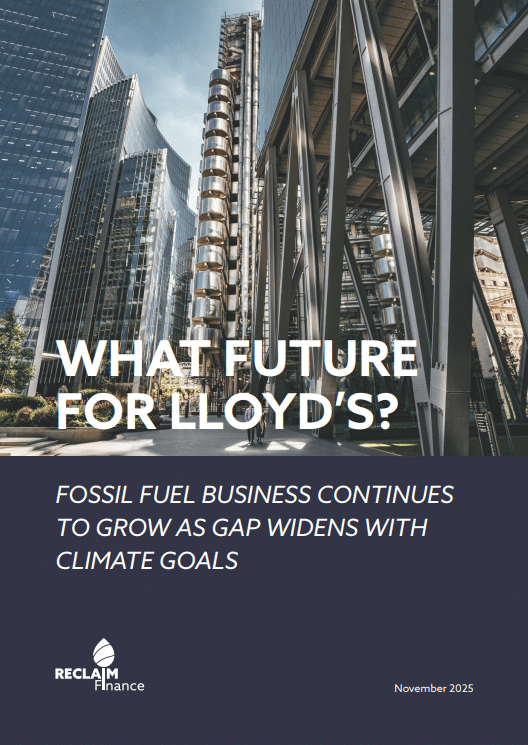
What future for Lloyd’s?
Lloyd’s of London, the world’s largest global center for fossil fuel insurance, is bucking the global trend by continuing to grow its fossil fuel business according to new analysis from Reclaim Finance, leaving the Lloyd’s marketplace increasingly misaligned with climate goals.
Key findings:
- Fossil fuel premiums in the Lloyd’s of London market have increased by 2.4% annually between 2020 and 2024, even after adjusting for inflation, while other insurers have on average seen a decline.
- Despite rapid growth in its sustainable energy business, Lloyd’s fossil fuel business was still more than four times larger in 2024. Lloyd’s remains the world’s largest global center for fossil fuel insurance, with 9% of the global market.
- Hiscox, one of the largest managing agents operating in the Lloyd’s market, is one of the Lloyd’s market’s biggest backers of fossil fuels, with more than 9% of its direct insurance premiums from fossil fuels. This compares to an average of 4% across the Lloyd’s market.
- Lloyd’s of London‘s growing fossil fuel business leaves it increasingly misaligned with global climate goals, as well as its own climate pledges: according to the Science Based Targets initiative (SBTi), insurers that continue to underwrite new fossil fuel projects are not aligned with the goal of reaching net zero.
Reclaim Finance urges Lloyd’s of London and Lloyd’s managing agents to take urgent action to align their business with the IEA’s pathway to Net Zero by 2050 and the SBTi’s Net-Zero Standard for Financial Institutions.
For Lloyd’s managing agents this most urgently means no longer providing (re)insurance cover for risks associated with new coal projects, new oil and gas projects or new liquefied natural gas export terminals.
Meanwhile Lloyd’s of London must use its regulatory power in its own market to define a clear and binding policy on the issue of fossil fuel expansion for all its managing agents.
